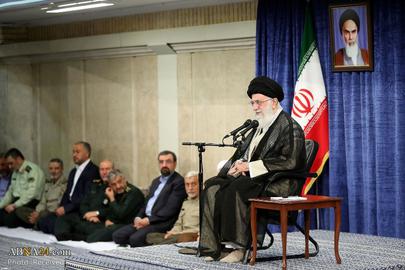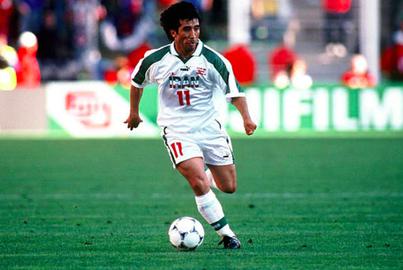This is the latest article in IranWire’s series Decoding Iranian Politics. The series examines the building rift between Iran’s various political factions, goes behind the scenes of the country’s fiercest political scandals and assesses what impact the complex web of government institutions has on Iranian politics today, as well as taking stock of some of the most defining moments in recent history.
What You Need to Know about the Supreme Leader’s Reaction to the US Withdrawal from the Nuclear Deal
Ayatollah Khamenei has repeatedly responded to the US government’s withdrawal from the Joint Cooperative Plan of Action (JCPOA), which President Trump announced on May 8, 2018.
In a public statement, the Supreme Leader stated that the US’ withdrawal from the nuclear agreement amounted to a violation of UN Security Council Resolution 2231, which was issued on July 20, 2015 to endorse the JCPOA. Furthermore, the Supreme Leader emphasized that Iran’s continued compliance with the JCPOA will be possible only if Europe provides a set of concrete guarantees. These include:
- Europe “compensating for its silence” over the last two years;
- A “promise not to raise the issues of missiles and the regional affairs of the Islamic Republic of Iran”;
- “Standing up to US sanctions”;
- Guaranteeing the sale of Iran’s oil;
- Guaranteed transactions with the Islamic Republic of Iran
The Supreme Leader threatened that Iran would “resume its nuclear activities” if European countries “lingered" over its demands.
Do the Leader’s Demands Indicate Iran’s Red Lines?
Very few Iranian observers believe that Ayatollah Khamenei will really insist that Europe observe all the conditions he has set with respect to the nuclear deal. But his conditions do demonstrate what major concerns he has about Iran’s future economic problems as a result of US sanctions.
Iran engaged in nuclear talks “to lift the sanctions,” Khamenei said — and expressed frustration that this did not happen under the JCPOA. He also attacked remarks made by Rouhani administration officials at the beginning of the talks – particularly that if the JCPOA was finalized “100 billion dollars would enter the country,” a claim he insisted was “not true”.
But most of the economic conditions Iran’s leader has set cannot be met. The EU will not be able to neutralize the entire package of US-imposed sanctions, and in particular, EU governments cannot force European private companies to work with Iran.
So it appears that the Leader’s tough conditions do not really signal Iran’s red lines for future talks. In reality, it will be a matter — again — of negotiating. Iranian officials will do their best to achieve good results along the lines that Ayatollah Khamenei has set out, but with a clear, specific focus on oil exports, financial transactions and cooperation with foreign companies.
What Was the Outcome of the Previous JCPOA-Related Conditions the Leader set?
The most crucial date to go back to is October 21, 2015, when the leader announced a set of JCPOA-related conditions about two and a half months after Iran’s National Security Council has approved the deal. According to the constitution, the council’s decision needed to be ratified by the Leader in order to be implemented.
Khamenei confirmed his approval of the nuclear deal in an official letter to President Rouhani, but stated that implementation of the JCPOA must follow precise criteria — chiefly, that the “unjust economic and financial sanctions” would come to an end. Specifically, he demanded that the US president and the European Union give “written declarations” to that effect. This condition was absolutely meaningless, as the text of the JCPOA had been published three months earlier, clearly indicating that the most important US sanctions would be suspended — and not “lifted.”
Ayatollah Khamenei also announced in his letter that “any new sanctions at any level with any excuse” would amount to “a breach of the JCPOA.” This included what he regarded as “fake excuses" that Iran supported terrorism or violated human rights. If new sanctions were introduced, he said, the Iranian government would be stop the implementation of the nuclear agreement.
Nevertheless, after this announcement, Ayatollah Khamenei never demanded the Rouhani administration end its commitment to the nuclear deal, despite the fact that, even before the end of Barack Obama’s presidential term, the US imposed a number of sanctions on Iran.
Is Khamenei Worried?
Ayatollah Khamenei is evidently extremely worried about the serious effects renewed sanctions could have on Iran’s economy. It’s a concern rooted in Iran’s experience of unprecedented sanctions during the second term of Mahmoud Ahmadinejad’s presidency, an ordeal that urged Khamenei to step back from his previous “uncompromising” stance on Iran’s nuclear program.
To understand how the leader’s view has changed, it’s worth remembering that Khamenei, prior to the gradual imposition of banking and oil sanctions by the EU and the USA in 2011 and 2012, repeatedly emphasized that Iran had already lived under sanctions for three decades. The country, he said, would be able to overcome and endure sanctions as it had done in the past. And he asserted this repeatedly over a number of years.
In fact, back in 2007, the Supreme Leader suggested that sanctions could strengthen Iran’s economy, and two years later even thanked the US for imposing them. As recently as 2012, he claimed that the imposed restrictions were making Iranians more dedicated and more steadfast people. In 2012, he publicly rejected claims that sanctions could seriously affect Iran’s economy more than once, adding that they were not sustainable. In September 2010, he also supported moves to bypass sanctions, which, according to him, government officials insisted they could do. Almost a year later, in August 2011, he said sanctions were being “successfully” bypassed, and shortly after, followed this up by appealing to the Ahmadinejad government to use “smart and wise” initiatives to neutralize sanctions.
Despite this, throughout these years, Khamenei contradicted himself several times, and the serious effect of oil and banking sanctions on Iran’s economy gradually led to a significant change in the leader’s perception. For example, on October 11, 2011, Khamenei described the sanctions as “brutal”; on March 21, 2013, he admitted that they had affected Iran’s economy (adding that he did not care if the Americans would be “happy” to hear his confession); on March 11, 2014, he described the sanctions as a ”total economic war” on Iran; on April 29, 2015, he said he could not deny that the sanctions had been effective; and on June 23, 2015, he emphasized that he “seriously” desired that nuclear talks could lead to the removal of the sanctions.
Will there be any practical outcome of the Leader’s New Position?
Many Iran experts believe that, despite Ayatollah Khamenei’s tough public stance on the JCPOA, he is still prepared to compromise. As the leader has repeatedly indicated in the past, the main motive for his engagement in nuclear talks was to pave the way for easing of economic sanctions. In other words, he took the difficult decision of retreating from his previous nuclear policies in order to save Iran’s regime from economic downfall.
Nonetheless, it would be hard to imagine that Ayatollah Khamenei would be prepared to maintain the nuclear deal at any cost. If he concludes there are no economic gains for the country, the Supreme Leader will not allow Iran to stay in the deal.
visit the accountability section
In this section of Iran Wire, you can contact the officials and launch your campaign for various problems


























comments